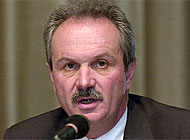
Central Bank boss warns Swiss businesses to gear up to challenge of euro

The chairman of the Swiss National Bank, Jean-Pierre Roth, has warned businesses in Switzerland to protect themselves against the "monetary revolution" taking place with the arrival of the euro, the single European Union currency coming into circulation in January.
At a symposium in Zurich on Monday, Roth said the rise in transactions for the euro both outside and within Switzerland would put the stability of the Swiss franc to the test.
“Obviously, our currency will be very much exposed to risks of changes in the rates (of exchange with the euro),” he said.
He voiced concern that some Swiss business had so far failed to “adopt a prudent attitude” with regard to possible volatility in the value of the Swiss franc. They had taken too much comfort in the stability of the Swiss franc since the introduction of the euro in the banking system in January 1999, he commented.
“We should not conclude that the rate of exchange between the franc and the euro will remain stable, just because this has so far been the case,” said Roth. He added that as long as Switzerland was not part of the European Union, the euro/franc rate of exchange would be subject to market forces.
With an eye on the tourism market, Roth advised businesses in Swiss border regions, in particular, to gear up to facilitating Euro transactions. “Our visitors will not be able to understand that the euro is not accepted here when it’s accepted in all neighbouring countries,” he said.
Markus Allenspach, head of research at the Swiss private bank Cantrade, told swissinfo he believes that despite the current pressure on Swiss businesses to adapt to the euro, they would in the long-term reap the benefits of a single currency for business transactions. “The introduction of the euro is a net positive for the Swiss economy,” he said.
Allenspach added that many businesses had already made the necessary internal changes to accommodate the evolution of a dual-currency model.
“A lot of Swiss companies are making internal changes to switch to euro-based calculations, because a large part of their sales go into euro-zone economies,” he said. “I think the Swiss economy will gradually adapt to an informal dual-currency system.”
Keep prices stable
Commenting on strategy, Roth said the National Bank’s monetary policy would be aimed at price stability and not on fixed exchange rates. “Our actions are not aimed at the stability of the exchange rate of the franc against the euro,” he said.
Roth said the Bank would continue to pursue an autonomous monetary policy, because Switzerland’s monetary identity set it apart from its euro-zone partners. He pointed to the comparatively low interest rates in Switzerland – roughly 1.5 per cent lower than in euro-zone countries – calling this factor an “indisputable asset for our long-term economic stability.”
Apart from voicing concerns, Roth welcomed the arrival of the euro. If the euro-zone offered long-term monetary stability, as envisaged by the Maastricht Treaty, Switzerland would find itself in a better financial environment than before, he said. Roth added that so far, the results had been encouraging.
swissinfo

In compliance with the JTI standards
More: SWI swissinfo.ch certified by the Journalism Trust Initiative






































You can find an overview of ongoing debates with our journalists here . Please join us!
If you want to start a conversation about a topic raised in this article or want to report factual errors, email us at english@swissinfo.ch.